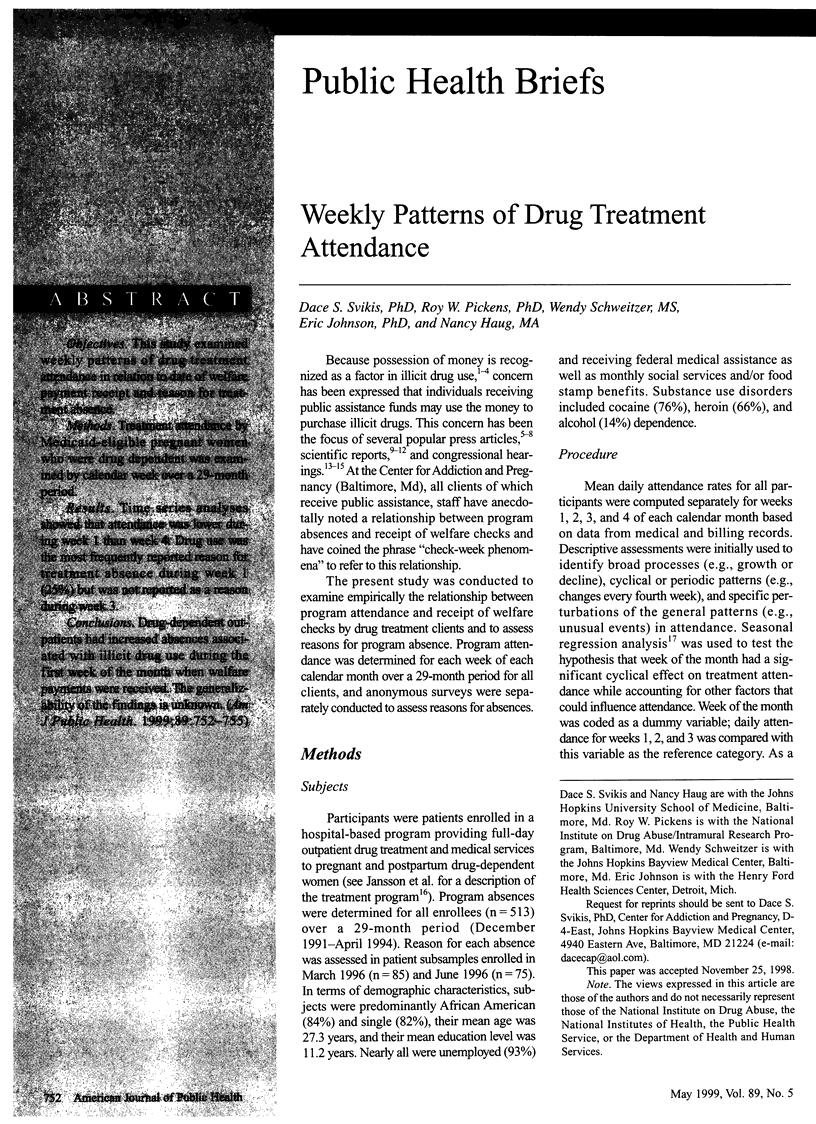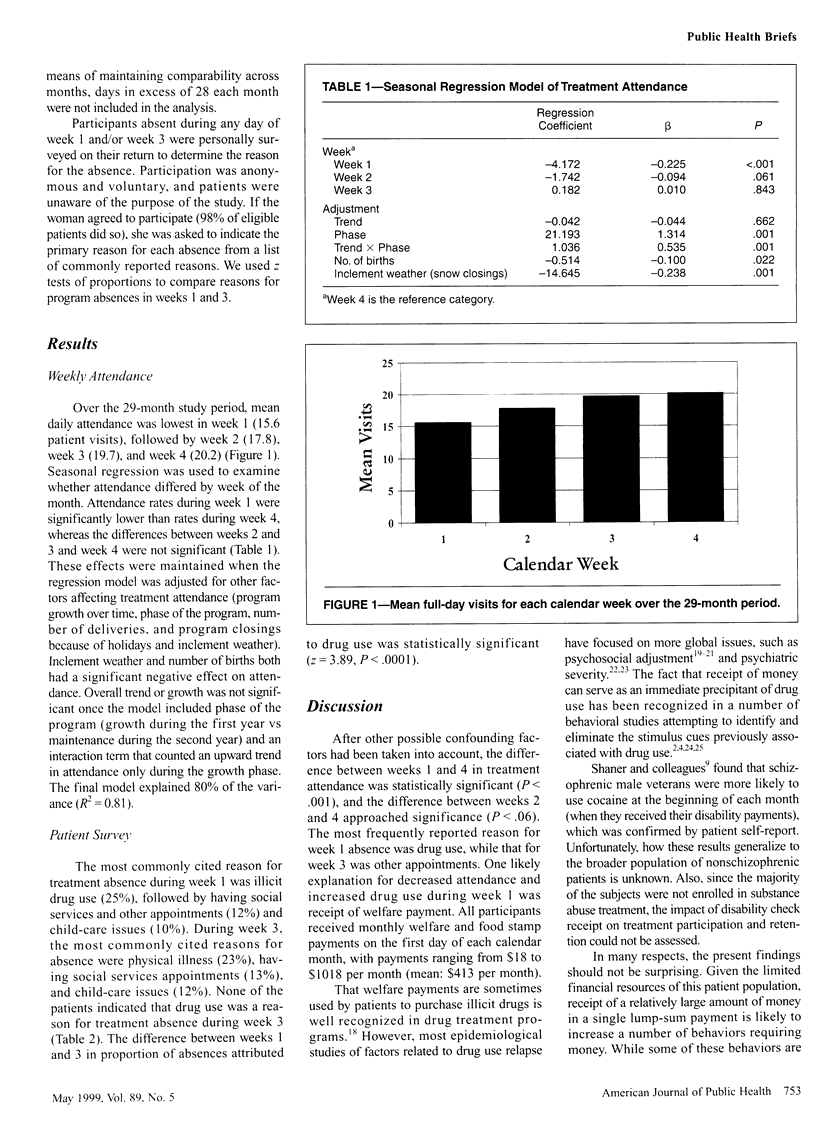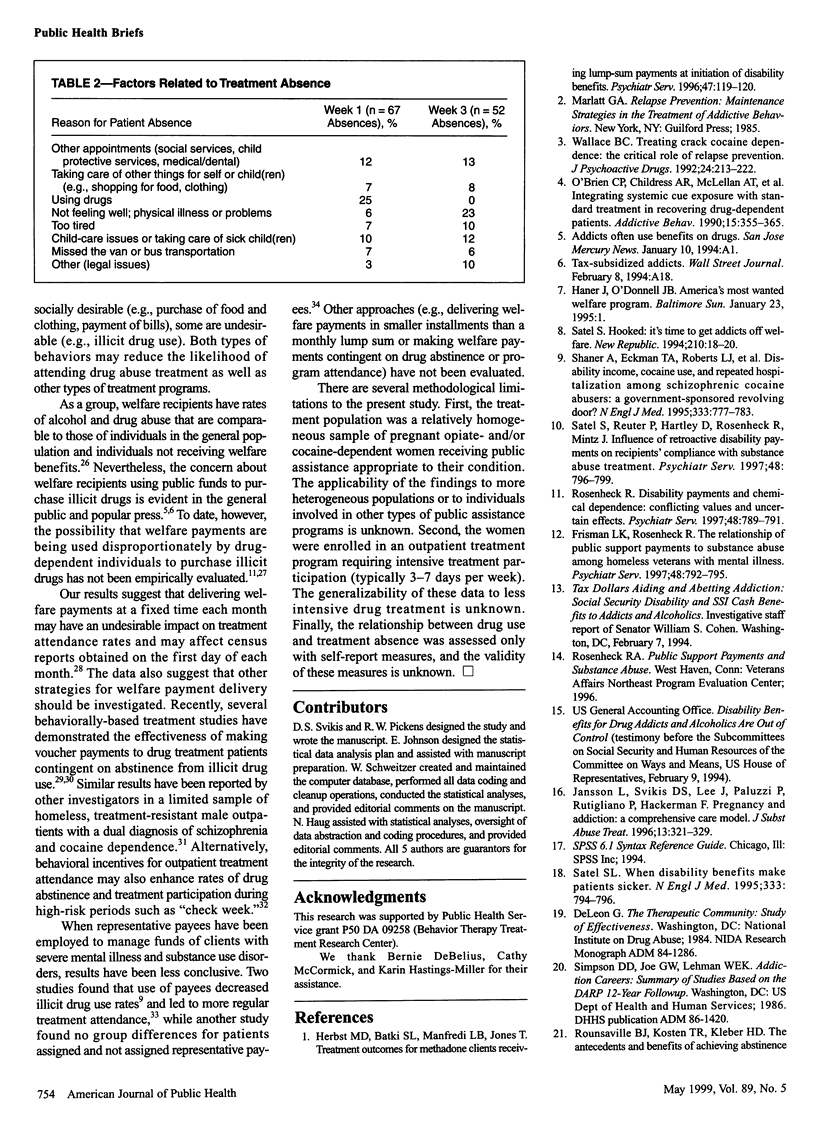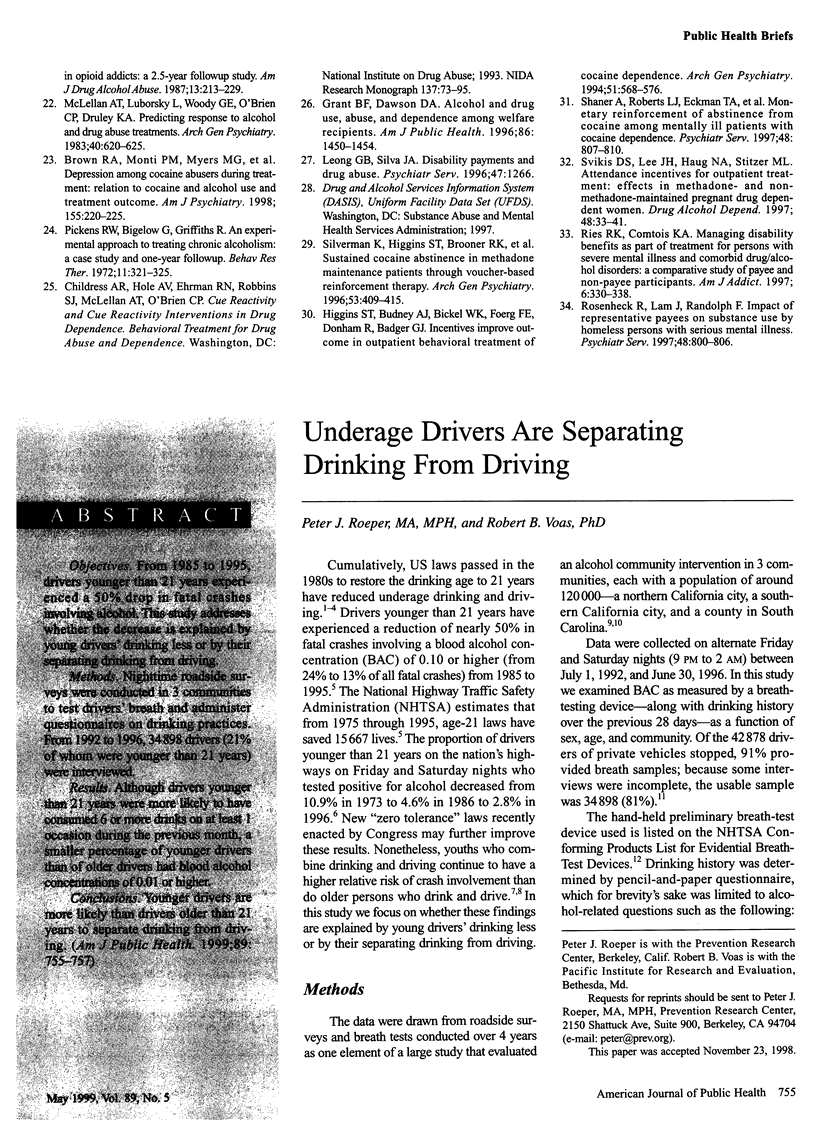Abstract
OBJECTIVES: This study examined weekly patterns of drug treatment attendance in relation to date of welfare payment receipt and reason for treatment absence. METHODS: Treatment attendance by Medicaid-eligible pregnant women who were drug dependent was examined by calendar week over a 29-month period. RESULTS: Time series analyses showed that attendance was lower during week 1 than week 4. Drug use was the most frequently reported reason for treatment absence during week 1 (25%) but was not reported as a reason during week 3. CONCLUSIONS: Drug-dependent outpatients had increased absences associated with illicit drug use during the first week of the month when welfare payments were received. The generalizability of the findings is unknown.
Full text
PDF



Selected References
These references are in PubMed. This may not be the complete list of references from this article.
- Brown R. A., Monti P. M., Myers M. G., Martin R. A., Rivinus T., Dubreuil M. E., Rohsenow D. J. Depression among cocaine abusers in treatment: relation to cocaine and alcohol use and treatment outcome. Am J Psychiatry. 1998 Feb;155(2):220–225. doi: 10.1176/ajp.155.2.220. [DOI] [PubMed] [Google Scholar]
- Frisman L. K., Rosenheck R. The relationship of public support payments to substance abuse among homeless veterans with mental illness. Psychiatr Serv. 1997 Jun;48(6):792–795. doi: 10.1176/ps.48.6.792. [DOI] [PubMed] [Google Scholar]
- Grant B. F., Dawson D. A. Alcohol and drug use, abuse, and dependence among welfare recipients. Am J Public Health. 1996 Oct;86(10):1450–1454. doi: 10.2105/ajph.86.10.1450. [DOI] [PMC free article] [PubMed] [Google Scholar]
- Herbst M. D., Batki S. L., Manfredi L. B., Jones T. Treatment outcomes for methadone clients receiving lump-sum payments at initiation of disability benefits. Psychiatr Serv. 1996 Feb;47(2):119-20, 142. doi: 10.1176/ps.47.2.119. [DOI] [PubMed] [Google Scholar]
- Higgins S. T., Budney A. J., Bickel W. K., Foerg F. E., Donham R., Badger G. J. Incentives improve outcome in outpatient behavioral treatment of cocaine dependence. Arch Gen Psychiatry. 1994 Jul;51(7):568–576. doi: 10.1001/archpsyc.1994.03950070060011. [DOI] [PubMed] [Google Scholar]
- Jansson L. M., Svikis D., Lee J., Paluzzi P., Rutigliano P., Hackerman F. Pregnancy and addiction. A comprehensive care model. J Subst Abuse Treat. 1996 Jul-Aug;13(4):321–329. doi: 10.1016/s0740-5472(96)00070-0. [DOI] [PubMed] [Google Scholar]
- Leong G. B., Silva J. A. Disability payments and drug abuse. Psychiatr Serv. 1996 Nov;47(11):1266–1266. [PubMed] [Google Scholar]
- McLellan A. T., Luborsky L., Woody G. E., O'Brien C. P., Druley K. A. Predicting response to alcohol and drug abuse treatments. Role of psychiatric severity. Arch Gen Psychiatry. 1983 Jun;40(6):620–625. doi: 10.1001/archpsyc.1983.04390010030004. [DOI] [PubMed] [Google Scholar]
- O'Brien C. P., Childress A. R., McLellan T., Ehrman R. Integrating systemic cue exposure with standard treatment in recovering drug dependent patients. Addict Behav. 1990;15(4):355–365. doi: 10.1016/0306-4603(90)90045-y. [DOI] [PubMed] [Google Scholar]
- Pickens R., Bigelow G., Griffiths R. An experimental approach to treating chronic alcoholism: a case study and one-year follow-up. Behav Res Ther. 1973 Aug;11(3):321–325. doi: 10.1016/0005-7967(73)90010-7. [DOI] [PubMed] [Google Scholar]
- Ries R. K., Comtois K. A. Managing disability benefits as part of treatment for persons with severe mental illness and comorbid drug/alcohol disorders. A comparative study of payee and non-payee participants. Am J Addict. 1997 Fall;6(4):330–338. [PubMed] [Google Scholar]
- Rosenheck R. Disability payments and chemical dependence: conflicting values and uncertain effects. Psychiatr Serv. 1997 Jun;48(6):789–791. doi: 10.1176/ps.48.6.789. [DOI] [PubMed] [Google Scholar]
- Rosenheck R., Lam J., Randolph F. Impact of representative payees on substance use by homeless persons with serious mental illness. Psychiatr Serv. 1997 Jun;48(6):800–806. doi: 10.1176/ps.48.6.800. [DOI] [PubMed] [Google Scholar]
- Satel S. L. When disability benefits make patients sicker. N Engl J Med. 1995 Sep 21;333(12):794–796. doi: 10.1056/NEJM199509213331210. [DOI] [PubMed] [Google Scholar]
- Satel S., Reuter P., Hartley D., Rosenheck R., Mintz J. Influence of retroactive disability payments on recipients' compliance with substance abuse treatment. Psychiatr Serv. 1997 Jun;48(6):796–799. doi: 10.1176/ps.48.6.796. [DOI] [PubMed] [Google Scholar]
- Shaner A., Eckman T. A., Roberts L. J., Wilkins J. N., Tucker D. E., Tsuang J. W., Mintz J. Disability income, cocaine use, and repeated hospitalization among schizophrenic cocaine abusers--a government-sponsored revolving door? N Engl J Med. 1995 Sep 21;333(12):777–783. doi: 10.1056/NEJM199509213331207. [DOI] [PubMed] [Google Scholar]
- Shaner A., Roberts L. J., Eckman T. A., Tucker D. E., Tsuang J. W., Wilkins J. N., Mintz J. Monetary reinforcement of abstinence from cocaine among mentally ill patients with cocaine dependence. Psychiatr Serv. 1997 Jun;48(6):807–810. doi: 10.1176/ps.48.6.807. [DOI] [PubMed] [Google Scholar]
- Silverman K., Higgins S. T., Brooner R. K., Montoya I. D., Cone E. J., Schuster C. R., Preston K. L. Sustained cocaine abstinence in methadone maintenance patients through voucher-based reinforcement therapy. Arch Gen Psychiatry. 1996 May;53(5):409–415. doi: 10.1001/archpsyc.1996.01830050045007. [DOI] [PubMed] [Google Scholar]
- Svikis D. S., Lee J. H., Haug N. A., Stitzer M. L. Attendance incentives for outpatient treatment: effects in methadone- and nonmethadone-maintained pregnant drug dependent women. Drug Alcohol Depend. 1997 Oct 25;48(1):33–41. doi: 10.1016/s0376-8716(97)00101-4. [DOI] [PubMed] [Google Scholar]
- Wallace B. C. Treating crack cocaine dependence: the critical role of relapse prevention. J Psychoactive Drugs. 1992 Apr-Jun;24(2):213–222. doi: 10.1080/02791072.1992.10471641. [DOI] [PubMed] [Google Scholar]


